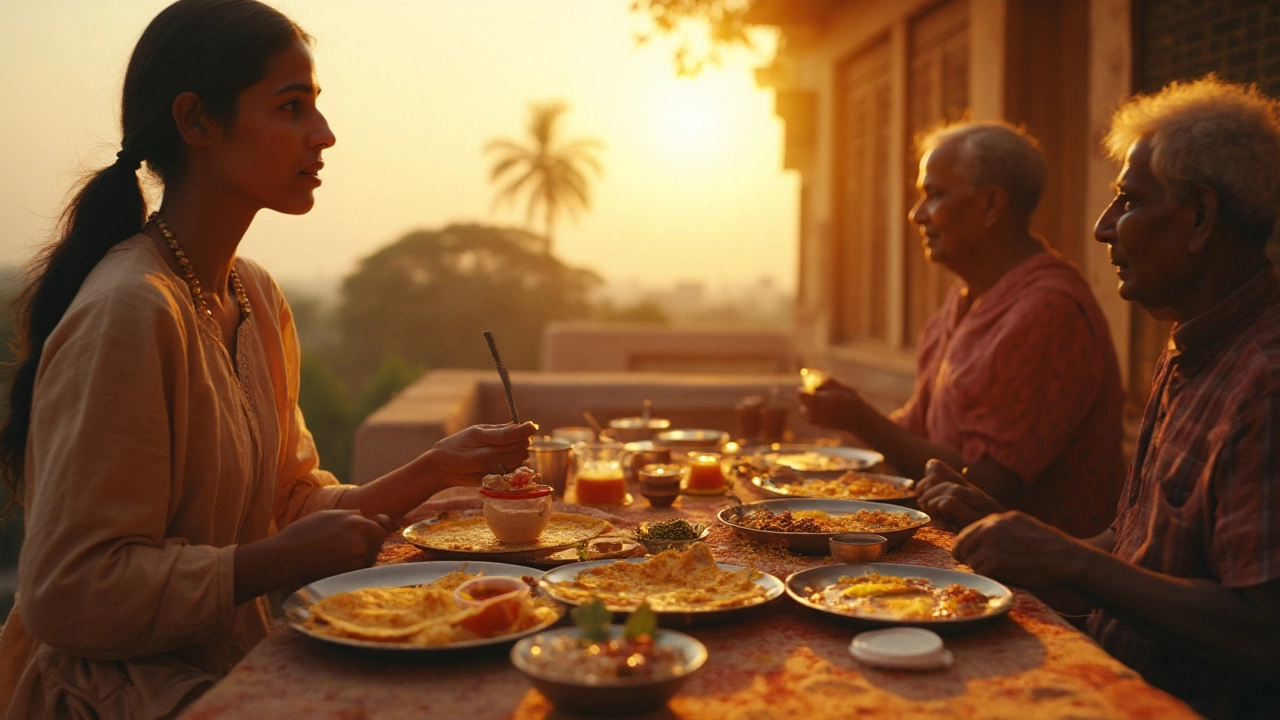You clicked to find out when to eat according to Ayurveda, not a lecture on ancient philosophy. Here’s the straight answer: align meals with daylight, put your biggest meal at mid-day, keep dinner early and light, and don’t graze all day. That pattern matches both classical texts and modern circadian science. The fine print? You’ll fine-tune by your dosha, season, and schedule.
- Best simple rule: Eat with the sun. Light breakfast after sunrise, main lunch around noon, light dinner before 8 pm.
- Midday (10 am-2 pm) is pitta time-your digestion is strongest-so lunch is your largest meal.
- Leave 3-6 hours between meals. Sip warm water or herbal tea; avoid constant snacking.
- Personalize: Vata needs regular meals, Pitta can’t skip lunch, Kapha can keep breakfast light or skip if not hungry.
- Early dinner (2-3 hours before sleep) improves sleep, reflux, and blood sugar stability.
Daily rhythm: the best times to eat
Around the clock, your body rides a daily cycle. Ayurveda maps it as kapha (6-10), pitta (10-2), vata (2-6) twice every 24 hours-day and night. Modern research calls it circadian rhythm, and it agrees with the core logic: your metabolism handles food better earlier in the day.
Here’s the baseline day that works for most people:
- Breakfast: 7:00-9:00 am. Keep it light to moderate, and eat only if you’re hungry. Think warm, easy-to-digest foods.
- Lunch (largest meal): 12:00-1:30 pm. This is when digestive fire (agni) peaks.
- Dinner: 6:00-8:00 pm, lighter than lunch. Finish 2-3 hours before sleep.
Spacing matters. Leave at least 3 hours between meals. If you’re very active or vata-predominant and truly hungry, a small snack is fine-choose something simple like a piece of fruit, a few soaked almonds, or a small bowl of soup. Sip warm water, jeera or ginger tea with meals instead of iced drinks. Cold drinks dim agni.
Why lunch at noon? In Ayurvedic terms, midday is pitta time-the fire element is strongest. In circadian terms, clock genes in your gut, liver, and pancreas cue better glucose handling and metabolism earlier in the day. A controlled trial in Cell Metabolism showed that shifting calories earlier improved insulin sensitivity and blood pressure without weight loss.
“Agni is the root of life; when agni is balanced, health is sustained.” - Charaka Samhita (Chikitsa Sthana)
I live in Bangalore, where sunrise sits near 6:00-6:30 am most of the year. I aim for breakfast around 7:30, lunch by 12:30, and dinner before 7:30. You don’t have to be perfect-just keep the pattern: biggest at noon, earliest dinner you can manage.
If you want one phrase to remember, it’s this: Ayurvedic eating times follow the sun.
Personalize by dosha, season, and life
Not everyone runs on the same fuel schedule. Your constitution (dosha), the weather, and your job all tweak the plan.
By dosha:
- Pitta (fiery, hungry, heats up fast): Never skip lunch. Eat on time and include cooling foods at lunch-cucumber raita, leafy greens, a squeeze of lime.
- Vata (light, airy, often irregular hunger): Keep steady timing. Favor warm, moist, grounding foods. If needed, a small mid-morning or mid-afternoon snack prevents energy dips.
- Kapha (slow, steady, tends to sluggish digestion): If you wake without appetite, go light or skip breakfast, then take a strong lunch. Keep dinner extra light and early.
By season (Ritu):
- Winter (Hemanta/Shishira): Appetite is stronger. Keep lunch hearty. Dinner can be moderate but still early.
- Summer (Grishma): Heat weakens appetite. Keep food lighter, juicy, and cooling. Lunch stays your main meal, but avoid heavy, oily dishes.
- Monsoon (Varsha): Digestion is delicate. Favor warm, spiced, soupy meals-khichdi with ghee, ginger, jeera, ajwain.
- Spring (Vasanta): Kapha accumulates. Go lighter, more bitter and astringent greens; early dinner helps.
- Autumn (Sharad): Pitta aggravates. Keep lunch on time and include cooling elements; avoid spicy late dinners.
Exercise and meals:
- Morning workouts: Have a small pre-workout bite if needed (banana, dates, or a small smoothie not ice-cold). Eat a proper breakfast within an hour after.
- Evening workouts: Avoid heavy dinner after intense late sessions. A light, warm meal works-dal, rice, vegetables-finish at least 2 hours before bed.
Fasting windows, the Ayurvedic way: Ayurveda favors a gentle overnight fast-dinner to breakfast-of about 12 hours. Many do well with an early 10-12 hour eating window (say 8 am-6 pm). Modern data backs this: early time-restricted eating improves glucose control and blood pressure. The American Heart Association’s 2022 statement also supports earlier meal timing for cardiometabolic health. Not for everyone, though-skip aggressive fasting if you’re pregnant, underweight, have a history of eating disorders, or take medications that require food.
| Profile | Breakfast | Lunch (largest) | Dinner | Notes |
|---|---|---|---|---|
| Pitta-dominant | 7:00-8:30 am, moderate | 12:00-1:30 pm | 6:30-7:30 pm, light-moderate | Do not skip lunch; add cooling sides |
| Vata-dominant | 7:30-9:00 am, warm & grounding | 12:00-1:00 pm | 6:00-7:30 pm, light but satisfying | Small snack ok if truly hungry |
| Kapha-dominant | Optional/light 8:00-9:00 am | 12:00-1:30 pm | 6:00-7:00 pm, very light | Favor warm, spiced, light meals |
| Summer | 7:00-8:30 am | 12:00-1:00 pm | 6:00-7:30 pm | Lighter, hydrating foods |
| Winter | 7:30-9:00 am | 12:00-1:30 pm | 6:30-7:30 pm | Heartier lunch; warm spices |
| Monsoon | 7:30-9:00 am | 12:00-1:00 pm | 6:00-7:00 pm | Soups, khichdi, avoid raw salads |

How to do it: steps, heuristics, and real schedules
Want to reset your meal timing without turning your life upside down? Use this one-week plan.
- Pick your dinner time and protect it. Choose a realistic time you can keep for 7 days-say 7:15 pm. Put it in your calendar like a meeting.
- Pull lunch earlier to the 12-1:30 pm window. If your team eats late, start earlier with a small bowl of dal or yogurt, then join them for salad/veg and skip seconds.
- Make lunch the heaviest plate. Half vegetables, a quarter protein (dal, paneer, fish, eggs), a quarter grains (rice, roti, millets), plus ghee or olive oil.
- Eat to 80% full. Stop when you could eat a bit more but feel satisfied. If you need a rule: plate your food, eat slowly for 20 minutes, then reassess before refills.
- Cut cold drinks with meals. Choose warm water, jeera/ginger tea, or thin buttermilk (not at night if you have sinus trouble).
- Keep a 12-hour overnight fast. If dinner ends 7:30 pm, breakfast lands near 7:30 am. If you wake starving, you likely under-ate at lunch or dinner-adjust.
- Mind your caffeine clock. Coffee or strong tea after 2 pm can push dinner late and disrupt sleep. If you love chai, have it mid-morning.
Real-life schedules you can copy:
- Office 9-6: Breakfast 8:00 (idli with sambar), Lunch 12:30 (dal, rice, sabzi, salad), Tea 3:30 (light, no biscuits daily), Dinner 7:15 (veg + protein, small grain serving).
- Field work/commute heavy: Breakfast 7:30 (poha with peanuts), Fruit at 10:30 if hungry, Lunch 1:00, Dinner 7:00. Carry roasted chana or fruit instead of bakery snacks.
- Student late classes: Breakfast 8:30, Lunch 12:30, Early Dinner 6:30, Small fruit or warm milk at 9 if you study late.
- Early riser gym: Pre-workout 6:15 (banana or dates), Breakfast 7:30 (omelette + veggies or upma), Lunch 12:30, Dinner 7:00.
- Vegetarian heavy days: Boost protein at lunch (dal + paneer or tofu). At dinner, keep grains modest; add soup.
Simple checklist (print this):
- Did I finish dinner 2-3 hours before bed?
- Was lunch my largest, warmest meal?
- Did I leave 3+ hours between meals without mindless snacks?
- Did I follow hunger cues (true hunger vs boredom)?
- Were my drinks warm or room temp with meals?
Common pitfalls:
- Late-night work calls that push dinner to 9:30 pm. Fix: keep a pre-call light meal at 7 pm; have only herbal tea later.
- Skipping lunch then overeating dinner. Fix: no meetings during lunch twice a week; block your calendar.
- Healthy snacks all day long. Even nuts and energy bars count. Fix: pick a snack window or skip snacks entirely most days.
- Cold smoothies for breakfast. They dampen agni. Fix: warm porridge, upma, or a room-temp lassi with spices.
Troubleshooting, FAQs, and safety
Fast answers to the questions that come up once you try this.
- Can I skip breakfast? If you’re kapha and not hungry, yes-have warm water and eat a strong lunch. If you’re pitta or very active, take breakfast.
- What about snacks? Use them like medicine, not habit. If your gap between meals is long and you’re truly hungry, take fruit, nuts, or a small soup.
- Coffee or tea timing? Best in the morning. After lunch, caffeine can disrupt sleep and push dinner late. If you need a pick-me-up, try ginger tea.
- Night-shift workers? Anchor meals to your ‘biological day’ and keep the same pattern: light meal after waking, main meal at your mid-shift “midday,” light meal before your sleep. Keep a dark, cool room for daytime sleep. On off days, shift slowly rather than flipping back and forth.
- Work travel and flights? Eat lightly during late-night travel. On arrival, shift to local lunch as your main meal and take an early light dinner to reset your clock.
- Intermittent fasting windows? Early windows (say 8 am-6 pm) fit Ayurveda best. Avoid long dry fasts that leave you wired and binge-prone.
- Acid reflux? Early, lighter dinner is your best friend. Avoid lying down for at least 2-3 hours after eating. Ginger, cumin, and small amounts of ghee can help.
- Diabetes or on glucose-lowering meds? Keep regular timing and avoid skipping meals without medical advice. Earlier, consistent meals often improve control, but work with your clinician for medication timing.
- Kids and teens? Don’t force long fasts. Keep regular meals, warm foods, and an early dinner. Growth needs consistent energy.
- Elders? Smaller, more frequent warm meals can work if appetite is low, but keep dinner early and light.
Safety notes and who should be cautious: if you’re pregnant, breastfeeding, underweight, recovering from illness or surgery, or have an eating disorder history, avoid strict fasting windows and get personalized advice. People on medications that require food should not delay meals.
Quick decision rules you can trust:
- When in doubt, make lunch bigger and dinner earlier.
- If you’re not hungry at breakfast and you’re kapha, have warm water and wait for hunger.
- If you’re shaky or irritable between meals (common in vata), add a small protein-rich snack and increase lunch.
- If you sleep poorly or wake heavy, move dinner earlier and lighter for a week before changing anything else.
What science says, in simple terms: your body metabolizes food better when the sun is up. Studies on early time-restricted eating (6-10 hour windows ending by early evening) improved insulin sensitivity and blood pressure. A 2022 scientific statement from the American Heart Association highlights earlier meal timing and consistent meal patterns for heart and metabolic health. None of this cancels Ayurveda; it confirms the same rhythm: eat more when your system is ready, not when your schedule screams.
If you love a one-line blueprint: Lunch like a king, dine like a monk, wake with real appetite.
